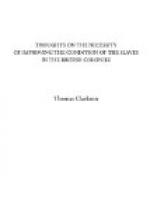Mr. Steele took the hint for the particular mode of improving the condition of his slaves, which I am going to describe, from the practice of our Anglo-Saxon ancestors in the days of Villainage, which, he says, was “the most wise and excellent mode of civilizing savage slaves.” There were in those days three classes of villains. The first or lowest consisted of villains in gross, who were alienable at pleasure. The second of villains regardent, who were adscripti glebae, or attached as freehold property to the soil. And the third or last of copyhold bondmen, who had tenements of land, for which they were bound to pay in services. The villains first mentioned, or those of the lowest class, had all these gradations to pass through, from the first into the second, and from the second into the third, before they could become free men. This was the model, from which Mr. Steele resolved to borrow, when he formed his plan for changing the condition of his slaves. Me did not, however, adopt it throughout, but he chose out of it what he thought would be most suitable to his purpose, and left the rest. We may now see what the plan was, when put together, from the following account.
In the year 1789 he erected his plantations into manors. It appears that the Governor of Barbadoes had the power by charter, with the consent of the majority of the council, of dividing the island into manors, lordships, and precincts, and of making freeholders; and though this had not yet been done, Mr. Steele hoped, as a member of council, to have influence sufficient to get his own practice legalized in time. Presuming upon this, he registered in the manor-book all his adult male slaves as copyholders. He then gave to these separate tenements of lands, which they were to occupy, and upon which they were to raise whatever they might think most advantageous to their support. These tenements consisted of half an acre of plantable and productive land to each adult, a quantity supposed to be sufficient with industry to furnish him and his family with provision and clothing. The tenements were made descendible to the heirs of the occupiers or copyholders, that is, to their children on the plantations; for no part of the succession was to go out of the plantations to the issue of any foreign wife, and, in case of no such heir, they were to fall in to the lord to be re-granted according to his discretion. It was also inscribed that any one of the copyholders, who would not perform his services to the manor (the refractory and others), was to forfeit his tenement and his privileged rank, and to go back to villain in gross and to be subject to corporal punishment as before. “Thus,” says Mr. Steele, “we run no risk whatever in making the experiment by giving such copyhold-tenements to all our well-deserving Negroes, and to all in general, when they appear to be worthy of that favour.”




